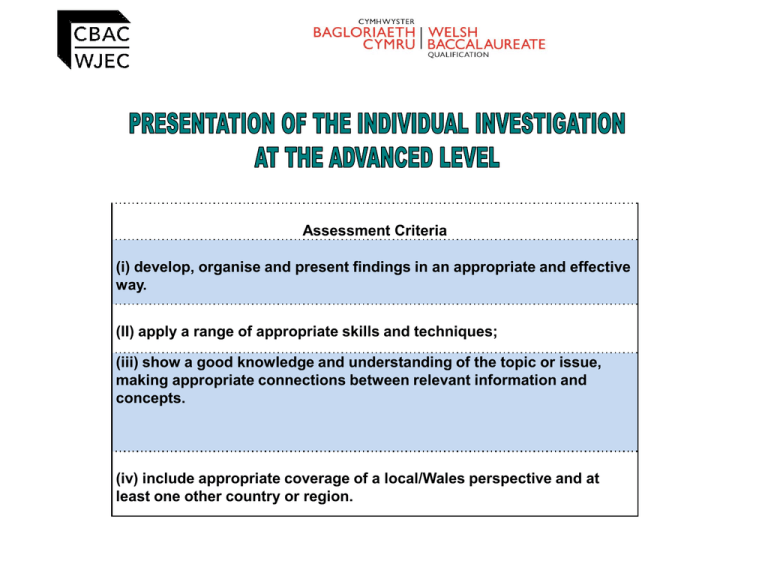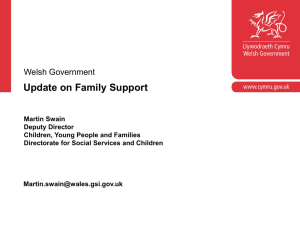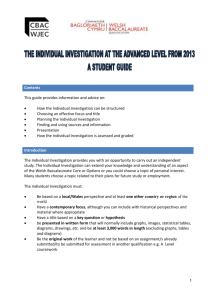Presentation of the Investigation at Advanced Level
advertisement

Assessment Criteria (i) develop, organise and present findings in an appropriate and effective way. (II) apply a range of appropriate skills and techniques; (iii) show a good knowledge and understanding of the topic or issue, making appropriate connections between relevant information and concepts. (iv) include appropriate coverage of a local/Wales perspective and at least one other country or region. •There is no ‘official’ or ‘right’ way to structure the Individual Investigation. Key Question or hypothesis Title Cover Wales/ other country or region Topic or issue Intro Outline hypothesis and methods Sections /themes Main Body Know/und Skills & techniques Topic or issue Conclusion & Evaluation Own performance Bibliography Phrase as a Key Question or Hypothesis Cover the issue, Wales and the other country/region. Introduce the topic or issue generally State your hypothesis. What you expect to find out in your investigation about Wales and the other country/region. Outline and comment on the methods you intend to use in your investigation Title Introduction Main Body •Meet the requirement to cover Wales and the other country or region chosen in balanced and effective way. Break the topic down into themes •Plan and present information using a logical sequence e.g. sections or chapters covering different aspects of the topic or issue. What are the challenges facing Wales and the US state of Wyoming in overcoming increasing levels of obesity among young people and what is being done to meet these challenges? Levels Causes of increase OBESITY WALES AND WYOMING Impact of increases Other initiatives Official/govt responses SORT AND ORGANISE YOUR RESEARCH •Based on your original plan,, sort, synthesise and analyse the information you have gathered. •Devise your own method to organise your notes e.g. in sections labelled with codes A2, A3, A4, etc. •You can mark with a different colour ink or use a hi-lighter to identify useful sections summaries, paraphrases or quotations perhaps on note cards, or separate sheets of lined paper. • • • Discuss the themes for both Wales and the other country/region as the individual Investigation progresses. This approach has the advantage of highlighting similarities and differences between the two countries/regions as you go along. If Wales and the other country are covered separately, similarities and differences can be covered in the conclusion. Support arguments with evidence from a range of relevant and appropriate sources. Provide evidence of a range of appropriate skills and techniques. Display a good knowledge and understanding of the topic or issue, making appropriate connections between relevant information and concepts. Main Body •Use normal prose with present tense to report well accepted facts - for example, 'the grass is green' •Use past tense to describe specific results - for example, 'When weed killer was applied, the grass was brown' •Avoid informal wording, don't address the reader directly, and don't use jargon, slang terms, or superlatives •Print or type using a 12 point standard font •Number pages consecutively •Start each new section on a new page •Produce between 2,000-2,500 words excluding sources. •Placing a heading at the bottom of a page with the following text on the next page (insert a page break!) •Dividing a table or figure •Submitting an Individual Investigation with pages out of order •Avoid using contractions? Use "cannot" instead of "can't", "do not" instead of "don't"? •Use third person as much as possible? Avoid using phrases such as "I think", "I guess", "I suppose". Bibliography Aim to produce an annotated bibliography including a comprehensive and detailed list of all sources used. Comment on the usefulness or reliability of sources or defend the inclusion of websites as references. Appendix Limit what is included in an appendix e.g. one completed copy of a questionnaire or interview used and/or additional relevant information relating to your research e.g. tally chart. Conclusion & Evaluation A summary of your findings Your views on these findings and the extent to which they met your original expectations. Comment honestly and in detail on the strengths and weaknesses of your own performance e.g. methods, time management, effectiveness of research, organisation and use of information. How would you have do things differently if you did this work again? FINISHING OFF Complete a first draft, checking the grammar, spelling and style generally. Do not be afraid to make changes at this stage. 1. Is my Individual Investigation clear and well organised? 2. Are my arguments presented in a logical sequence? 3. Are all sources properly referenced to ensure that I am not plagiarising? 4. Have I answered my key question or Proved my hypothesis? Good Findings are organised, developed and presented, in an effective and where appropriate creative way. A range of appropriate and demanding skills and techniques are applied effectively and creatively. • Demonstrates a thorough and comprehensive knowledge and understanding. Makes and explains complex connections between relevant and information and concepts e.g. explains how and why attitudes may change. Very good coverage of topic and both perspectives. While emphasis may be on one, an effective balance is maintained.









